Errol Flynn and a producer named Victor Pahlen were spending time in their favorite Cuban casinos in 1958 when Castro's rebellion was nearing success. Although both men had enjoyed the good life in Batista's Cuba, they realized that they were sitting on a unique opportunity, so they stayed in Cuba, hung out with the revolutionary troops, and took to the streets with silent cameras to record history as it happened. The result of that footage was this unique fifty-minute documentary called Cuban Story. It was written, edited, and directed by Pahlen. Errol Flynn did some "narration" for the film, which basically means that he offered some thoughts on camera for about five minutes. Flynn may have been inebriated at the time, and his health was poor enough to cause him to wheeze noticeably when he did his brief monologues. He would be dead within a year.
Except for the five minutes when Flynn talks directly to the camera, the visuals consist entirely of 45 minutes of silent newsreel footage of inconsistent quality. That newsreel portion of the film is also supposed to be narrated by Errol Flynn, but it is not. Oh, it was all delivered in the first person as if it were Flynn speaking his thoughts, but the lines were actually spoken by someone else pretending to be Flynn, albeit with a completely different voice and accent! The soundtrack for the newsreel footage consists entirely of the faux-Flynn narration and several stirring reprises of "Adelante, Cubanos" ("Onward, Cubans"), Castro's revolutionary anthem.
Flynn and Pahlen had seen the cruelties of Batista's reign firsthand, so they took a decidedly pro-Castro stance in their documentary. That attitude may seem shocking when the film is viewed by Americans today, but it was not unusual at all in 1958. Castro was then widely considered to be liberating his people from a murderous dictator. In fact, Castro's uprising was popular enough, and Batista was unpopular enough, that Castro's revolution even received contributions from rich, idealistic Cubans, who obviously did not suspect that the freedom fighter would soon turn die-hard Marxist and expropriate the very land which had generated those contributions. Castro was also considered to be a hero by many Americans, possibly even a majority of Americans in 1958. Director Sydney Pollack claims that he was thinking of America's attitude toward Castro when he started working on his film, The Interpreter. Pollack told an interviewer:
ďI remember when I was a kid in New York, and Castro first came to power. There was a ticker-tape parade in New York, and he went on television and everybody in America worshipped him. He was speaking English, and he was this great freedom fighter who had liberated his country. And, slowly, heís become a guy you canít write anything bad about, you canít do this, you go to jail. Thatís what happened with all these guys. What really fascinated me was what would happen if any of these dictators came face to face with who they were before they became corrupt.Ē
Unfortunately for Victor Pahlen and his film, Castro's relationship with the West soured after his victory, and Fidel soon began to cement his alliance with the Soviet Union. By the time Cuban Story was ready to screen, its pro-Castro tone had made it anathematic anywhere but Russia, so the film was screened exactly once, at The Moscow Film Festival. After that it was forgotten, completely unseen for more than 40 years until recently unearthed and released on DVD with an introduction by Victor Pahlen's daughter, Kyra.
By any objective standard, it is a weak documentary. The narration is shallow and soporific, the Flynn impersonation is a sleazy and ineffective trick, and the incessantly repeated theme song will stir memories of riding through "It's A Small World." Some of the footage is actually in good shape, but other parts are deplorable. The DVD box says it all: "The picture and sound quality of this DVD will at times be below contemporary standards." If that's how their marketing guys spun it on the box, you can guess how an objective reviewer might have phrased it. None of that really matters, however, because the film consists of priceless and historically significant footage which had been lost for four decades and still can't be seen elsewhere. If you are interested in the Cuban revolution, this film is actually worth seeing.
Since the value of this film lies in the rarity of the footage, it makes sense to summarize the film with a small gallery:
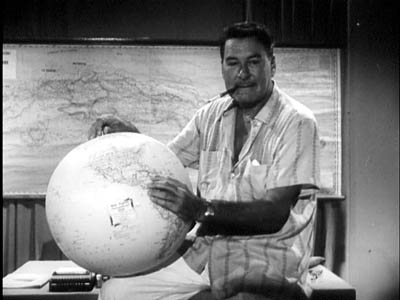
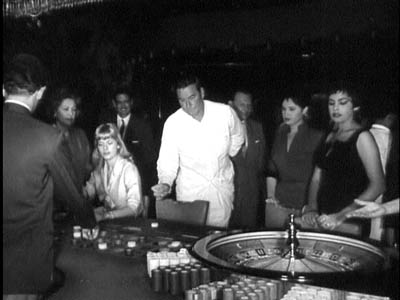
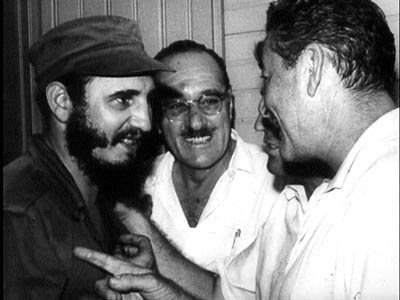
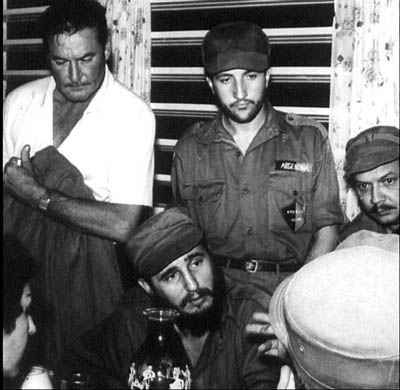
Above and right: Errol Flynn and Fidel Castro, together at last.
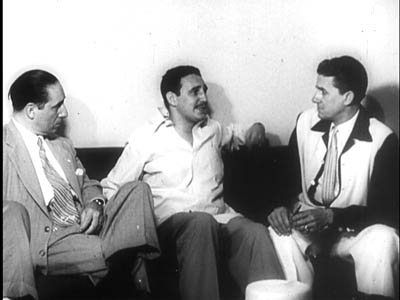
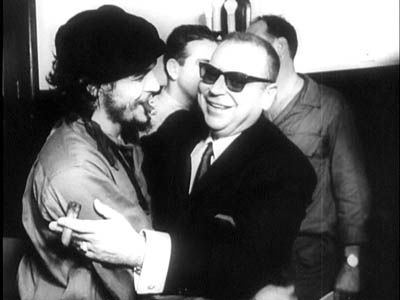
Rare footage of a beardless Castro.
The usually brooding Che Guevara caught in a rare moment of merriment.
